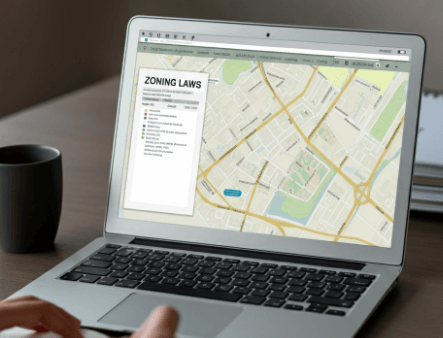Understanding “how to find out what my land is zoned” is crucial for anyone looking to maximize the potential of their property. Zoning laws determine what can be constructed on a piece of land, and understanding these rules can greatly affect future development and investment opportunities. According to recent studies, nearly 80% of property owners are unaware of their land’s zoning designation, which can lead to costly mistakes. This is where seasoned experts like Steve Daria and Joleigh come in, offering valuable insights as renowned real estate investors and land buyers for cash. Their expertise can help demystify the zoning process, ensuring you make informed decisions. Whether planning to build or sell, understanding “how to find out what my land is zoned” can save you time and money. Book a free discussion with Steve Daria and Joleigh today to get personalized guidance and explore your options. Don’t miss the opportunity to unlock your property’s full potential with expert advice.
Key Points
- Contact Local Zoning Offices: The first step to understanding your land’s zoning is to reach out to your local zoning office. They can provide official zoning classification and detailed information about permitted uses and restrictions on your property.
- Use Online Zoning Maps: Many municipalities offer online zoning maps that allow you to conveniently check the zoning status of your land. These maps often include color-coded sections and legends that make it easy to identify zoning categories and regulations.
- Consult with Real Estate Professionals: Integrating the help of a real estate agent or zoning expert can provide important insights and help interpret complex zoning information. Professionals like these can guide you through the process and ensure you understand how zoning laws impact your property.
- Review Property Deeds: Property deeds often include important zoning details that can clarify restrictions and permitted uses. Examining these documents can help verify that your understanding of the property’s zoning is accurate.
- Understand Zoning Codes: Familiarize yourself with the specific zoning codes and rules that apply to your land. This knowledge is essential for planning future developments and avoiding potential legal issues.
What is zoning, and why is it important for my land?
Zoning is a land use planning system that categorizes areas for specific purposes, such as residential, commercial, or industrial use.
It’s a critical part of city planning, ensuring that land is used to benefit the community while minimizing conflicts.
Knowing “how to find out what my land is zoned” is essential because it affects what you can build or do on your property.

For instance, if your land is zoned for residential use, you might not be able to develop a commercial business there.
This zoning information can significantly impact your property development plans and investment opportunities.
Understanding your land’s zoning is crucial for making informed decisions about buying, selling, or developing property.
It helps prevent legal problems and makes sure your plans follow local rules.
To determine “how to find out what my land is zoned,” you can contact your local zoning office or check their online resources.
This step is vital for anyone involved in property-related activities, helping to guide your decisions and maximize your land’s potential.
Get Started: Get Your Cash Offer Below…
We are direct land buyers. There are no commissions or fees and no obligation whatsoever. Start below by sharing where your property is and where we can send your offer…
How can zoning impact the value and use of my property?
Zoning can significantly impact both the value and use of your property.
Zoning regulations determine what activities are allowed on your land, such as building homes, opening businesses, or farming.
These rules can increase property value by ensuring compatible land uses, but they can also limit what you can do with your property.
For example, if your land is zoned for residential use, it might be more valuable to potential homeowners but less appealing to commercial developers.
Conversely, commercial zoning can make a property attractive for businesses but may restrict residential development.
Understanding the zoning of your property is critical to making informed decisions about its use and potential development.
This is why it’s important to know “how to find out what my land is zoned.” You can determine this by contacting your local zoning office or checking their online resources.
Knowing your property’s zoning helps you plan effectively and maximize its value and utility.
Are there online tools to check my land’s zoning?
- Online Zoning Maps Are Widely Available: Many municipalities provide online zoning maps that are easily accessible through their official websites. These maps allow property owners to view zoning classifications and permissible uses for their land from the comfort of their own homes.
- Digital Tools Offer Convenience and Efficiency: The use of online tools eliminates the need for physical visits to local zoning offices. This saves time and resources, making it convenient for property owners to obtain the necessary zoning information.
- Verify Information for Accuracy: While online tools are helpful, it is crucial to cross-check information with official sources to ensure accuracy. Errors or outdated data can lead to misunderstandings about permitted land uses, so verification is key.
- GIS Systems Enhance Zoning Information: Geographic Information Systems (GIS) are often embedded in online zoning platforms, providing detailed spatial data and visual representations. These systems help users understand complex zoning dynamics and property boundaries.
- Use Multiple Sources for Comprehensive Understanding: Relying on a combination of online tools, local zoning offices, and professional consultations ensures a more thorough understanding of zoning regulations. This approach minimizes the risk of oversights and maximizes the potential for informed decision-making.

Where can I find information about my land’s zoning?
Information about “how to find out what my land is zoned” is essential for anyone looking to plan or develop their property.
The first place to start is your local zoning office, where staff can provide specific details about your property’s zoning designation.
Many zoning offices also offer online resources, making it convenient to access maps and zoning codes from the comfort of your home.
Additionally, public records at your county or city clerk’s office can be a valuable source of information.
Understanding how to find out what land is zoned helps you recognize the potential and limitations of your property, whether you’re considering building, selling, or buying.
By knowing your zoning, you can avoid legal issues and make sure your plans align with local laws.
Accessing zoning information is typically straightforward and can be done through simple inquiries or online searches.
This ease of access empowers you to make informed decisions, maximizing your land’s potential and ensuring compliance with regional regulations.
What documents should I review to understand my land’s zoning?
- Zoning Ordinances Provide Foundational Guidance: Reviewing local zoning ordinances is essential as they outline the specific regulations and permissible uses for different land zones. These documents help property owners understand the legal framework governing land use in their area.
- Property Deeds Offer Historical Context: Property deeds often contain important historical information about land use and any existing restrictions. Understanding the details in these deeds can clarify past zoning decisions and their impact on current land use.
- Zoning Maps Visualize Land Use Designations: Accessing zoning maps allows property owners to visually interpret how their land is designated and its relation to neighboring zones. These maps are crucial for identifying zone boundaries and potential opportunities or limitations for development.
- Building Permits Reflect Compliance and Opportunities: Reviewing past building permits can provide insights into what construction or modifications have been legally approved on the property. This information is valuable for understanding compliance with zoning laws and assessing future development possibilities.
- Comprehensive Plans Indicate Long-Term Community Goals: Comprehensive plans guide future development and zoning changes, reflecting a community’s long-term vision for land use. Understanding these plans can help property owners anticipate zoning changes and align their property goals with broader community objectives.
What should I do if I discover a zoning issue with my property?
Finding a zoning issue with your property can be daunting; however, there are measures you can implement to address it.
First, contact your local zoning office to confirm how to find out what land is zoned and understand the specifics of the issue.
It’s crucial to gather all the relevant information and documentation from them.
Next, consider consulting a legal expert with experience in zoning laws to explore your options for resolving the issue.
Sometimes, applying for a rezoning or special permit that can legally align your property’s use with its zoning might be possible.
If the process seems overwhelming, reaching out to seasoned professionals like Steve Daria and Joleigh, renowned real estate investors and land buyers, for cash can be invaluable.
They can provide insights and strategies tailored to your situation. To ensure the best outcome, don’t hesitate to seek their expert advice and guidance.
By understanding “how to find out what my land is zoned” and taking proactive steps, you can effectively manage and resolve any zoning issues.
**NOTICE: Please note that the content presented in this post is intended solely for informational and educational purposes. It should not be construed as legal or financial advice or relied upon as a replacement for consultation with a qualified attorney or CPA. For specific guidance on legal or financial matters, readers are encouraged to seek professional assistance from an attorney, CPA, or other appropriate professional regarding the subject matter.
